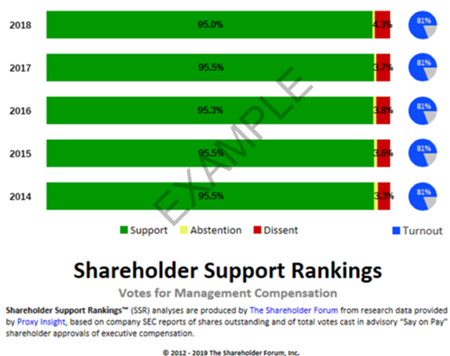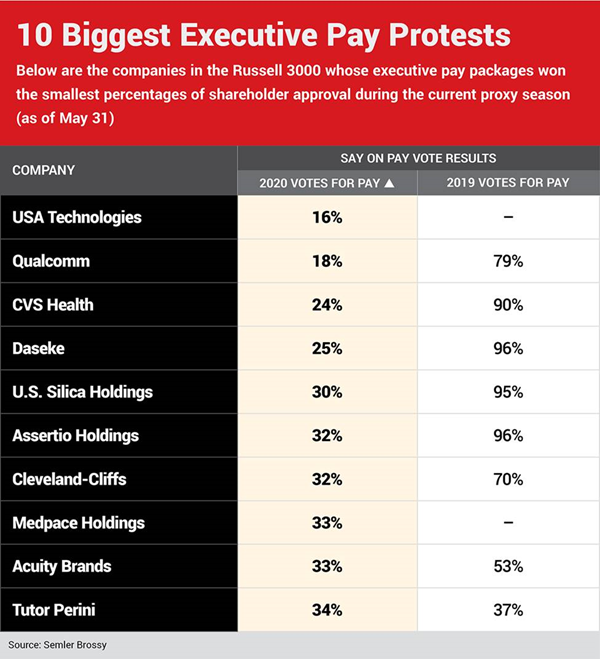|
Negative Say-On-Pay Votes
Signal ‘Blood in the Water’ for Activists
Large negative votes on executive pay
and incumbent directors in uncontested elections may attract insurgent
hedge funds hoping to find companies with large disgruntled
shareholder bases.
By Ronald
Orol
Updated on July 10, 2020,
03:53 PM ET
In 2018, Bed
Bath & Beyond Inc. (BBBY) received the support of only
21% of voting shares for its executive compensation, down from an
already troubling 44% of support in 2017.
By March 2019, a trio of activists — Legion
Partners Asset Management LLC, Ancora
Advisors LLC and Macellum
Advisors GP — emerged
on the scene with a campaign to replace the entire
12-person board of the embattled retailer.
The company had other characteristics of a business an activist could
focus its attention on. In particular, the company had lost about 20%
of its value in the year leading up to the effort and 77% over the
previous four years, while there remained potential value hidden
amongst a hodgepodge of smaller retail assets.
However, the big negative vote was
likely a big contributing factor to the activists’ campaign,
which ultimately led to the ouster the company's CEO and major changes
to the board’s makeup.
Bed Bath & Beyond isn't alone in being targeted by an activist after
receiving a big negative vote on pay.
And while votes on both executive pay and directors in uncontested
elections are generally nonbinding, the votes can be embarrassing —
especially as companies struggle to deal with the fallout from the
coronavirus pandemic. The votes can attract an activist hedge fund
hoping to find companies with a large disgruntled shareholder base.
"When shareholders have shown they are willing to vote against
management or directors, that may lead activists to believe
shareholders will be receptive to their message," said James
Langston, partner at Cleary
Gottlieb Steen & Hamilton LLP. "One of the levers
activists have is the proxy contest and trying to convince
shareholders to vote out the board."
Langston noted that discontent among shareholders could encourage an
activist investor who might be looking at it and some other target
candidates.
Lawrence Elbaum,
partner and co-head of shareholder activism at Vinson
& Elkins LLP, added that activists who already have
companies on their radar as possible campaign targets always look for
additional signs of shareholder discontent.
“A sizable vote against directors or against executive compensation
could be what they are seeking to bolster their campaigns. It can be
blood in the water for activists,” he said.
As the 2020 proxy season comes to a close, some companies with big
negative votes might want to keep a close eye out for potential
activists.
According to consulting firm Semler Brossy, in 2020 some 45 U.S.
companies tallied more than 50% votes against their respective
executive pay packages as of July 2. In addition, the firm found one
or more directors at 815 companies over the same time received a
negative vote of 20% or worse, while 41 directors at 31 companies
received more than 50% negative votes.
For example, in mid-May, CVS
Health Corp. (CVS) CEO Larry
Merlo received an overwhelming negative vote of 76% of
shares opposing his pay package. In March, Qualcomm
Inc. (QCOM) CEO Steve Mollenkopf got a similarly large
protest vote of 82% against his pay package.
At the same time one or more directors on boards of a wide variety of
companies, including Netflix
Inc. (NFLX), Boeing
Co. (BA), Bunge
Ltd. (BG) and Nabor Industries Ltd. (NBR),
received large negative votes in uncontested elections. At Netflix,
for example, CEO Reed
Hastings received a 33% negative vote.
It is not uncommon for large negative votes on CEO pay to be coupled
with negative votes on directors. For example, about 41% of votes
opposed Bunge’s executive compensation. In addition, directors Vinita
Bali and Andrew
Ferrier received 41% and 25% negative votes on their
elections, respectively.
Activists will often try to identify the source of the negative votes
in the company’s shareholder base. Sometimes a negative vote on CEO
pay has broader implications beyond concerns about remuneration.
Insurgent investors may look to voting recommendation reports issued
by proxy advisers Institutional
Shareholder Services Inc. or Glass
Lewis & Co. LLC.
“They [activists] will seek out the source of the negative vote, maybe
by picking up ISS and
Glass Lewis reports to review whether these proxy advisers had an
issue with the company’s board or executive pay,” Elbaum said.
In addition, activists examine CEO pay as it relates to the company's
total shareholder returns, including capital distributions.
"If an activist believes that pay is not aligned with performance at a
company with investor opposition to the pay package, it could be
because there has been some underperformance and that increases the
prospects an activist will launch a campaign," Cleary's Langston said.
He added that a negative say-on-pay isn't necessarily a problem on its
own but could be "the tip of the iceberg" in terms of issues at the
business.
"The vote could point to larger problems at the company that the
activist could focus on," he said. "An activist might believe the
company is more vulnerable than they had originally thought."
Some big negative pay votes have emerged at companies that have been
targeted by activist hedge fund-type investors in the past. For
example, only 16% of USA
Technologies Inc. (USAT) shares supported executive pay
packages at a meeting that occurred
a few days after Douglas
Braunstein’s activist fund, Hudson
Executive Capital LP, took control of the board in a
settlement.
Also, only 42% of votes supported CEO pay at Tom Barrack’s Colony
Capital Inc. (CLNY) in 2020. The company had already
been targeted with a proxy contest by Jason Aintabi’s Blackwells
Capital LLC. Aintabi settled with Colony after the company announced
that it was accelerating Barrack’s resignation. (Barrack resigned from
the CEO role on July 1.)
In other cases, such as at Bed Bath & Beyond, activists emerged after
a big negative pay vote.
For example, in 2018, about 23% of shares voted against drug company Progenics
Pharmaceuticals Inc. CEO Mark
Baker in an uncontested election. In 2019, two
Progenics directors, Peter Crowley and Michael Kishbauch, received
majority negative votes in an uncontested election. Shortly after
that, activist fund Velan Capital launched a written consent
solicitation board fight, which does not need to wait for an annual
meeting, to successfully unseat
Baker and two others from the company’s board. This year, Progenics
merged with Lantheus Medical Imaging Inc. (LNTH)
in a deal that closed in June.
Chipotle
Mexican Grill Inc. (CMG)
is one of the highest-profile examples of a big negative vote on pay
that drove an activist into the fold.
In 2014, only 23% of shares backed Chipotle’s executive compensation
package. The Mexican-themed fast-food chain at the time had co-CEOs, a
rare situation that typically is a red flag for investors. By 2016 —
when investor sentiment around executive pay was still not great —
Bill Ackman’s Pershing
Square Capital Management LP swooped
in with a campaign and ultimately a settlement to add
dissident directors.
Elbaum noted that companies that wait too long to examine the root
cause of negative shareholder votes could soon be targeted by
activists, who often will try to paint boards as tone deaf to
shareholder feedback.
“Companies and their boards should see these negative votes as
valuable opportunities, well before the next proxy season, to drill
down on and proactively incorporate recent shareholder feedback,” he
said.
|




